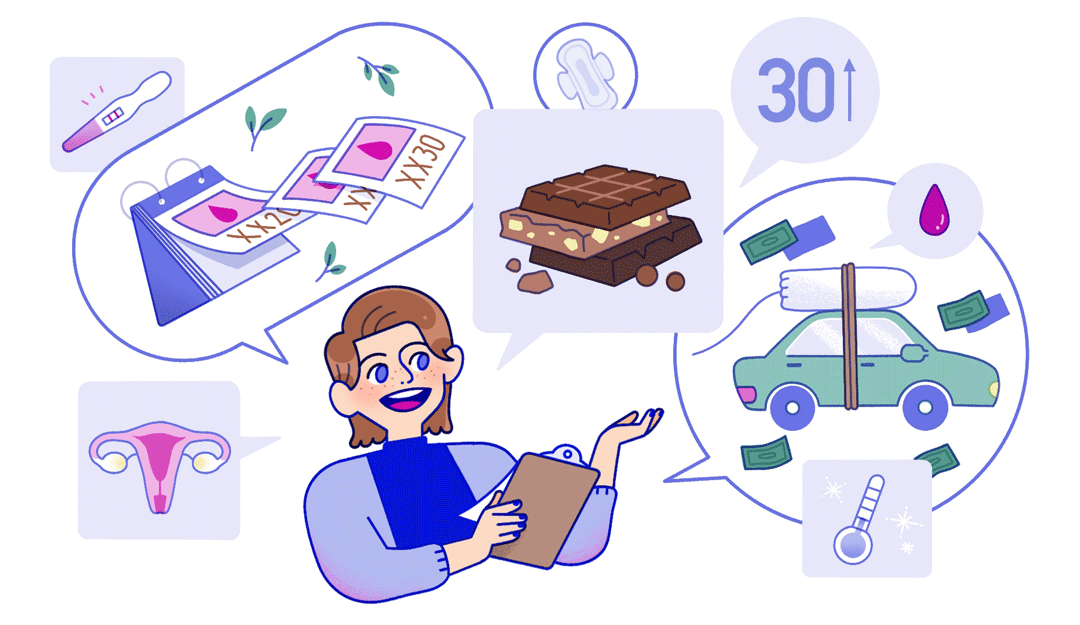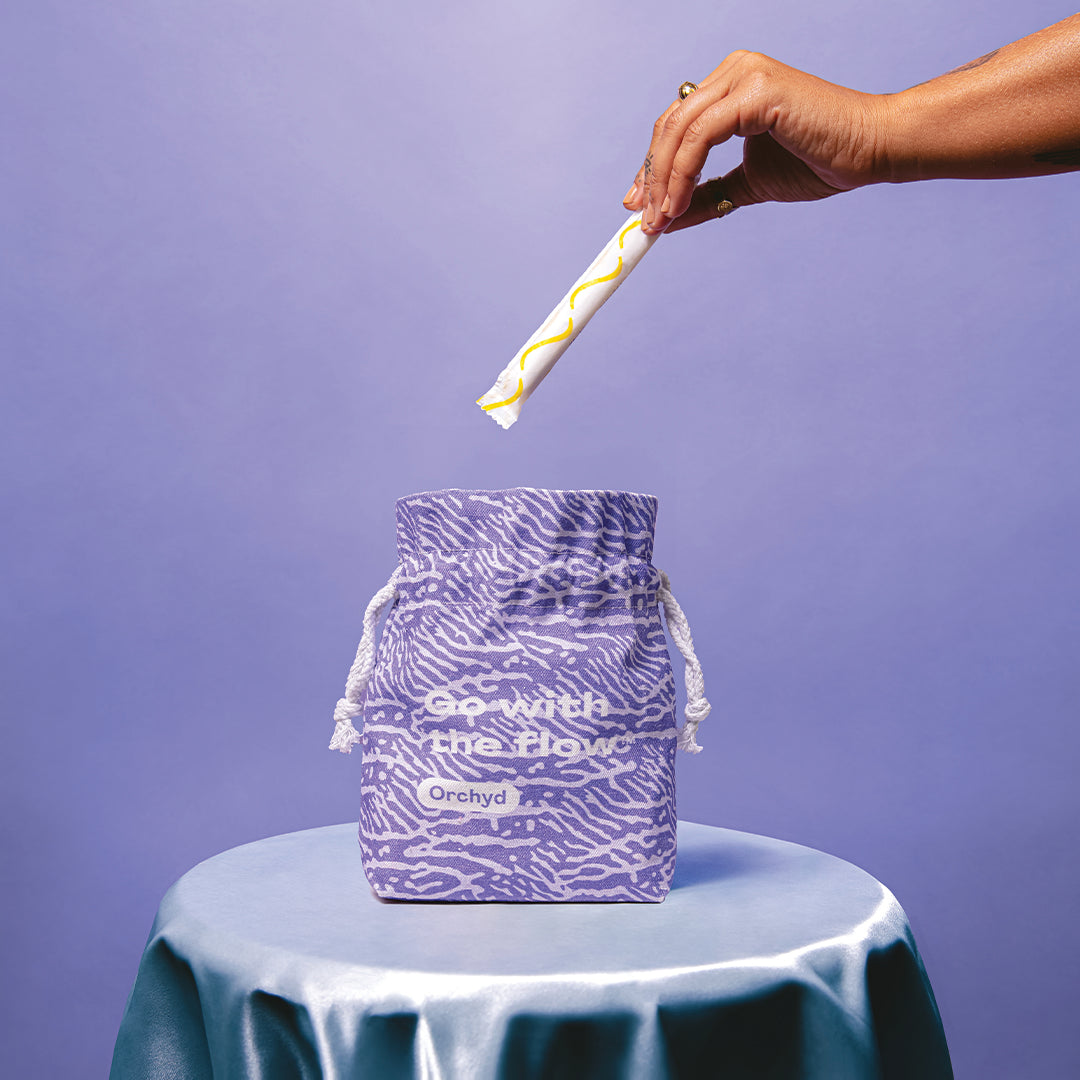
15 Interesting Facts About Periods
Share
 "That time of the month." It's a phrase we've all heard (and probably said) throughout our lifetimes. It's a week that's associated with irritability, pain, weird cravings, and usually a ton of overall discomfort. And every month—typically like clockwork—it keeps coming back. You might think you know everything there is to discover about your menstrual cycle, but we're willing to bet we've found a few previously undiscovered, interesting facts about periods. Test your knowledge with these tidbits.
"That time of the month." It's a phrase we've all heard (and probably said) throughout our lifetimes. It's a week that's associated with irritability, pain, weird cravings, and usually a ton of overall discomfort. And every month—typically like clockwork—it keeps coming back. You might think you know everything there is to discover about your menstrual cycle, but we're willing to bet we've found a few previously undiscovered, interesting facts about periods. Test your knowledge with these tidbits.
1. About half of American women crave chocolate when they're on their periods.
If that sweet, chocolatey goodness is all you can think of during that time of the month, you're in good company. In fact, about half of period-aged people in the U.S. report having intensified cravings for cacao a few days before through a few days after their periods, according to Psychology Today. During this time, the ebb and flow of estrogen and progesterone are likely the culprits for the cravings in many cases.
2. Women in their thirties are most likely to have PMS.
If it seems like you got crabbier and crampier when you crossed into the milestone of your thirties, it might not be in your head. According to Womenshealth.gov, women in their thirties are most likely to have PMS on average. Those headaches, bloating, and sessions of unexpected moodiness are very real.
3. The average woman spends about as much as a car down payment on feminine products over her lifetime.
Does it feel like you're always running to the store and spending your hard-earned cash on tampons, pads, and liners? Well, that's because it's estimated that women spend an average of $6,360 on feminine products during their reproductive years (ages 12 to 52), according to Swnsdigital.com.
4. Your period can actually make you bleed from your eyes.
Don't freak out just yet! This is a rare period disorder that doesn't affect many people, but if you're one of the people who's affected by vicarious menstruation, you could, indeed, bleed from your eyes. Ideally, you only bleed from your uterus during your period, but women who suffer from vicarious menstruation also bleed from other organs (like their eyes, for instance). Fortunately, you'd probably already be well-aware if you had this illness.
5. Your period gets worse when it's cold.
As if frigid winter days weren't bad enough all by themselves, cold weather could be making your period heavier and longer than usual. The winter season could also contribute to more significant pain levels than periods that take place when the summer sun is shining. The same is true for people who live in cold climates versus those who dwell in hotter areas.
6. Disney has delved into the world of periods.
In 1946, Walt Disney Productions produced the short flick The Story of Menstruation, in which a motherly narrator helps girls understand what's going on with their bodies during puberty. It's said that this risque flick was the first to use the word "vagina" in its screenplay.
7. The average age at which girls get their first periods has changed throughout history.
Fluctuations of malnutrition and diseases in various parts of history have changed the average ages at which girls and other people got their first periods. During the Renaissance (the 1300s to 1600s), for example, the average age was reported to be 16. Today, thanks to better nutrition and healthcare, the average age is about 12.5. Of course, this is just an average, meaning some people start way earlier, while others start way later. There is no "normal" time to begin menstruating.
8. The average person spends the equivalent of 10 years on their period.
If you think about it, it sure does seem like those three tampon-free weeks are overshadowed by the pain and annoyance of your period week every single month. Those seven-or-so days just keep coming back, and over time, those weeks add up. Marie Claire reports that the average woman spends around a decade of her life on her period.
9. Women may not actually be born with all of their eggs.
Traditional education taught us that women have all of their eggs as soon as they come out of the womb. According to Growing Generations, that may not be the case. It seems that some studies are suggesting that women may continue to produce new eggs throughout their lifetimes.
10. Periods don't prevent pregnancy.
Before you skip the condom, bear in mind that sperm can live in your body for up to five days. That means if you miss the pill or skimp on the protection while you're menstruating, you could still wind up with a bun in the oven. Besides, STIs don't care if you're on your period, so you should never go without protection unless you know it's a safe situation.
11. You don't lose as much blood as you probably think.
Sure, sometimes it can feel like you're losing oceans of body fluid when your blood begins to exit your body. In reality, you're only losing an average of six to eight teaspoons throughout your entire cycle. While the majority of women and other people will lose less than 16 teaspoons of blood, some people may experience heavy menstruation cycles. For periods that are more than 16 teaspoons or last longer than seven days, you may want to speak to your doctor, as this could be a sign of something more serious, such as anemia.
12. Period-related brain fog is not a real thing.
According to a Swiss and German study summarized by Our Bodies Ourselves, the changes in hormone levels that women and other people experience throughout their monthly cycles do not affect attention, cognition, or working memory.
13. Your body weight can affect your periods.
LOLA reports that a change in body weight (increase or decrease) of 20 percent could cause your hormone levels to change. With a change in hormone levels often comes a change in menstrual cycles.
14. Sleeping with a nightlight on can help you regulate your cycle.
Study findings conclude that sleeping with a nightlight by the bedside can shorten menstrual cycles. The study suggests that 100-watt light bulbs may be beneficial for treating infertility, contraception, and other endocrine interventions.
15. There's a fantastic assortment of words for periods.
Check out the top euphemisms for periods across the globe. In Brazil, a person might say, "It's raining on the farm." On the other hand, the Japanese might come right out and say, "Blood festival."
These are just 15 of the many, many interesting facts about your period. We hope you learned something new.

